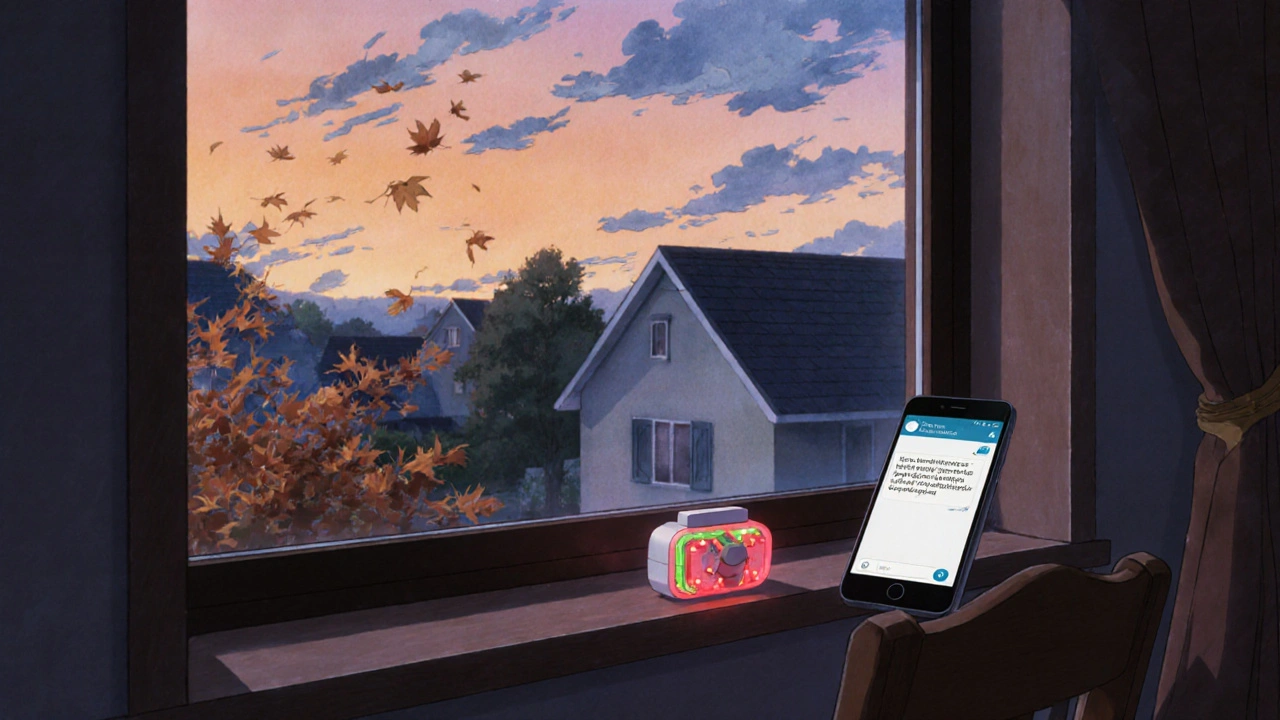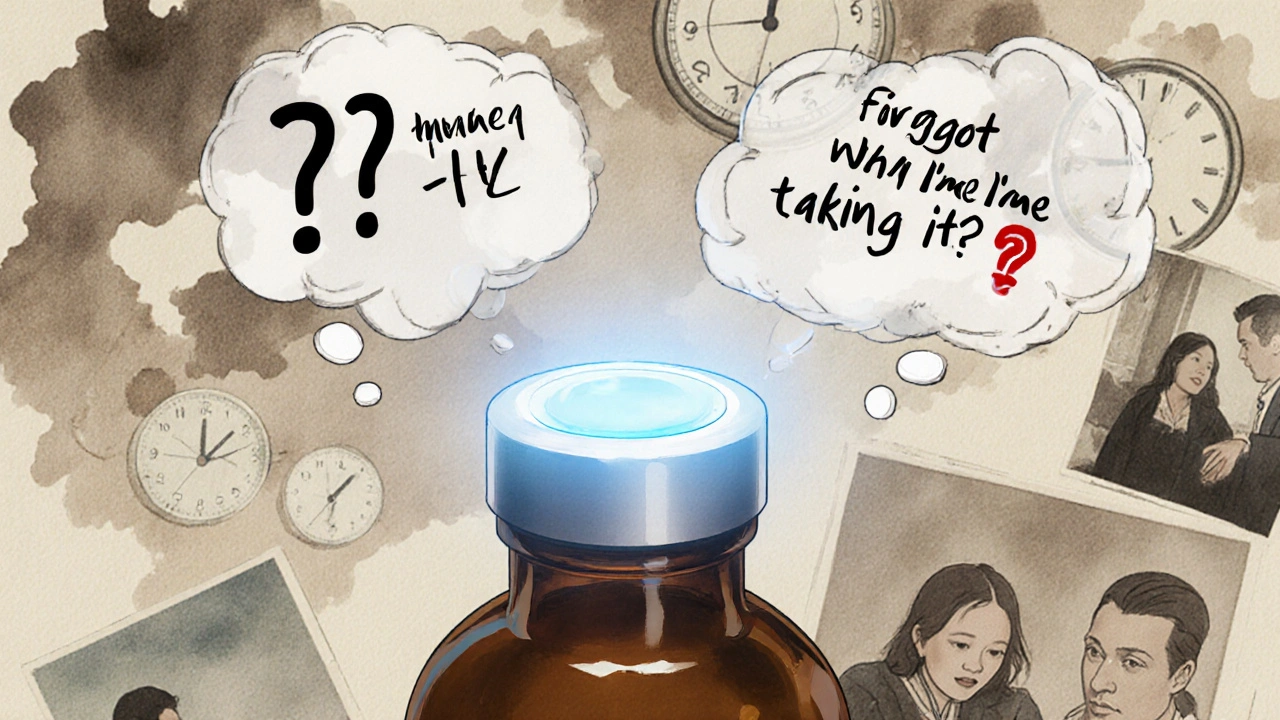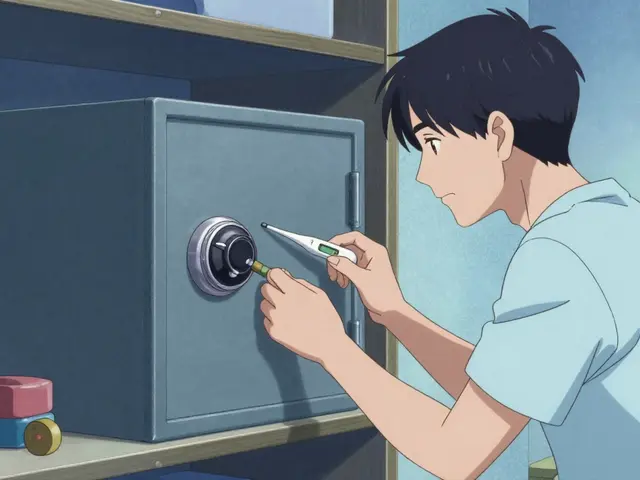Forgetting to take your pills isn’t just a minor inconvenience-it can land you in the hospital. Around 50% of people with chronic conditions miss doses at least once a week. For seniors taking five or more medications daily, it’s not laziness or rebellion-it’s cognitive overload. Your brain can’t keep track of blue pills at 8 a.m., red pills at noon, and green pills at 8 p.m. when you’re also trying to remember appointments, meals, and family calls. That’s where smart pill caps and dispensers come in. These aren’t fancy gadgets for tech lovers. They’re life-saving tools built for real people who forget-because forgetting matters.
Why Forgetfulness Is a Silent Health Crisis
Every year, medication non-adherence leads to 125,000 deaths in the U.S. alone, according to the CDC. That’s more than car accidents. It’s also why hospitals spend $100-$300 billion annually treating preventable complications from missed doses. The problem isn’t just seniors. It’s anyone with diabetes, heart disease, high blood pressure, or depression. But older adults are hit hardest. Nearly 54% of people over 65 take four or more prescriptions. Their brains aren’t broken-they’re overwhelmed.
Traditional pill organizers? They help-until you forget to refill them. Alarm clocks? You turn them off. Paper lists? They get lost. What you need isn’t another reminder. You need a system that works even when you’re distracted, tired, or confused.
How Smart Pill Caps Work (Without the Tech Overload)
Smart pill caps are simple: they screw onto standard prescription bottles and track when you open them. No apps. No buttons. Just a tiny sensor inside the cap that records the exact time you take your medicine. If you don’t open it by the scheduled time, the system sends a text, call, or alert to a family member or caregiver. Some even track how much medicine is left using weight sensors.
AdhereTech’s Aidia Smart Bottle is one of the most popular. It fits right on your bottle of blood pressure meds or statins. When it’s time, the cap glows blue. Miss the window? It turns red. And if you open it but don’t take the pill, it asks you why-‘Too many pills?’ ‘Side effects?’ ‘Forgot why I’m taking it?’ That feedback helps doctors adjust your plan, not just nag you.
Other systems like Tenovi’s Cellular Pillbox don’t even need a smartphone. The device itself has a small screen with colored lights: red means it’s time, green means you took it. It connects directly to the cellular network, so your daughter in another state gets a text if you skip a dose. No downloads. No passwords. Just lights and alerts.
Smart Dispensers: When You Need More Than a Cap
If you’re managing 10+ pills a day, a cap won’t cut it. That’s where smart dispensers come in. These are small boxes with multiple compartments that open automatically at set times. Hero Health’s dispenser, for example, holds up to 28 doses. At 8 a.m., the front panel lights up, a gentle beep sounds, and the correct compartment slides open. If you don’t take it within 30 minutes, it repeats the alarm. And again. And again. Until you do.
It’s not just loud. It’s persistent. One user on Reddit said it saved her mother’s life during a UTI scare. Her mom kept missing her antibiotics. After the Hero dispenser arrived, adherence jumped from 60% to 98%. The machine didn’t care if she was watching TV or napping-it kept reminding her until she acted.
Some dispensers, like the MedQ from Alzstore, lock the compartments until it’s time. That’s crucial for people with dementia who might grab all the pills at once. But locked systems don’t always connect to caregivers. You get safety-but no data. You can’t tell if someone opened it early or skipped a dose unless you’re there to check.

Comparing the Top Systems
Not all smart pill solutions are built the same. Here’s how the leading options stack up:
| System | How It Works | Cost (Device + Monthly) | Best For | Limitations |
|---|---|---|---|---|
| Aidia Smart Bottle (formerly AdhereTech) | Screws onto prescription bottles. Tracks openings. Color-coded lights. Asks why you missed a dose. | $149 + $39/month | People on 1-3 daily meds who want simple, bottle-integrated tracking | App has connectivity issues; iOS ratings are low |
| Tenovi Cellular Pillbox | Self-contained box with lights. No app needed. Cellular connection sends alerts. | $199 + $29/month | Seniors who avoid smartphones; caregivers who want remote monitoring | Doesn’t dispense pills-just reminds. Requires manual refills. |
| Hero Health Dispenser | Automatic dispenser with timed compartments. Flashing lights, alarms, repeats every 30 mins. | $499 + $0/month | Complex regimens (6+ pills), dementia, or hearing/vision impairments | Expensive. Needs weekly refilling. Takes up counter space. |
| MedQ Electronic Dispenser (Alzstore) | Locked compartments. Alarms repeat until taken. No connectivity. | $129-$249 (one-time) | High-risk users who might overdose if unsupervised | No remote alerts. No data for doctors. Quiet alarms may not be heard. |
| AARDEX Pill Connect | Clinical-grade cap with 70+ analytics. Used in trials. Requires software. | $299 + $49/month | Research settings, high-risk patients under medical supervision | Too expensive and complex for most home users |
What Really Works-Based on Real Users
Look at the reviews. Tenovi’s pillbox has a 4.7/5 rating on Trustpilot. Why? Because users say things like: ‘Mom with early dementia finally takes her pills consistently-the red light system is genius.’ No app. No confusion. Just a light that says, ‘It’s time.’
Hero Health’s dispenser gets praise from caregivers who say, ‘It’s the only thing that made her take her meds.’ The repeating alarm is the key. People don’t forget because they’re lazy. They forget because they’re distracted. A single beep doesn’t stick. A 30-minute loop does.
But not all systems work. AdhereTech’s app has a 2.8-star rating on the App Store. Users complain about notifications failing, syncing errors, and confusing interfaces. The hardware works-but the software doesn’t. That’s a dealbreaker. If your system needs a phone app to function, and you’re over 70, you’re already at a disadvantage.
One user on Reddit admitted they ‘gamed’ their Pill Connect cap by opening it without taking the pill. And that’s the truth no gadget can fix: no device can force you to swallow the medicine. The best systems reduce forgetfulness. But they still need human cooperation.
What to Look for When Choosing a System
Here’s what actually matters when you’re choosing:
- Does it work without a phone? If you or your loved one doesn’t use smartphones, skip anything that requires an app.
- Are alarms loud and repeatable? If the alarm stops after one beep, it’s useless. Look for systems that repeat every 15-30 minutes until taken.
- Can a caregiver get alerts? Texts or calls to family members are critical. You can’t be there every day.
- Is it easy to refill? Weekly refills are fine if you have help. Daily refills? Not sustainable.
- Does it track missed doses? A system that just reminds you is good. One that tells your doctor why you missed is better.
- What’s the total cost? A $500 device with no monthly fee might be better than a $150 device with $40/month charges.
Also, check if your insurance covers it. Medicare Advantage plans are starting to pay for these devices if they reduce hospital visits. UnitedHealthcare and other insurers have partnered with Tenovi and Hero Health to cover them for high-risk patients. Ask your pharmacist or doctor. You might qualify.

What’s Coming Next
The next wave of smart pill tech won’t just remind you. It’ll know you took it. MIT’s AgeLab is testing edible sensors that send a signal from inside your body when the pill dissolves. That’s not science fiction-it’s coming by 2025. No more guessing. No more gaming the system. Just real data.
Meanwhile, Hero Health is adding voice-activated emergency response. Say ‘I feel dizzy’ and the device calls 911 and alerts your family. That’s the future: not just adherence, but safety.
But for now, the best solution is still the simplest one that fits your life. A cap that glows. A box that beeps. A light that turns green when you do what you’re supposed to. That’s not magic. That’s care.
Frequently Asked Questions
Do smart pill dispensers really work?
Yes-when chosen correctly. Studies show users of systems like Aidia and Hero Health improve adherence from 60-70% to over 90%. The key is matching the device to the person’s needs. A simple light-based system works better for someone with dementia than a complex app-based one.
Are smart pill dispensers covered by insurance?
Some Medicare Advantage plans now cover them if they reduce hospitalizations. Medicaid coverage varies by state. Private insurers like UnitedHealthcare and Humana have pilot programs. Ask your doctor or pharmacist to help you submit a prior authorization request. Many devices qualify under durable medical equipment (DME) codes.
What if I can’t afford the monthly fee?
Some companies offer payment plans or discounts for low-income users. Hero Health has no monthly fee. MedQ is a one-time purchase. Tenovi’s $29/month is often less than the cost of one ER visit from a missed dose. Check with local Area Agencies on Aging-they sometimes provide grants for adherence devices.
Can these devices help with dementia?
Yes, especially locked dispensers like MedQ or Hero Health. They prevent overdosing and provide consistent cues. But avoid anything that requires reading screens or using apps. Simple visual cues (lights) and loud, repeating alarms work best. Remote alerts to caregivers are also critical for safety.
How long do the batteries last?
Battery life varies. Tenovi lasts up to 90 days. Aidia lasts 30 days. Hero Health’s dispenser runs on standard AA batteries and lasts about 6 months. Always check the manual. Some models have backup power in case of outages-important for people who rely on daily meds.
What if I open the dispenser but don’t take the pill?
Some systems, like Aidia, ask why you skipped the dose. This helps your doctor adjust your regimen. Others just record it as a missed dose. But no system can confirm you swallowed the pill. That’s still a human step. The goal is to reduce forgetfulness-not replace responsibility.
Next Steps
If you’re considering a smart pill device, start here:
- Write down all your medications, times, and doses.
- Ask your doctor if you’re at risk for non-adherence.
- Call your insurance to see if they cover any devices.
- Try a simple, no-app system like Tenovi or MedQ first.
- Set up remote alerts for a family member or caregiver.
- Give it 30 days. Track your adherence with a paper log.
If you see improvement, stick with it. If not, try another. There’s no one-size-fits-all. But there is a solution that fits you. And that’s worth finding.










kshitij pandey
November 14, 2025 AT 14:38Brittany C
November 16, 2025 AT 10:55Sean Evans
November 17, 2025 AT 14:50Anjan Patel
November 17, 2025 AT 17:36Scarlett Walker
November 17, 2025 AT 18:11Hrudananda Rath
November 18, 2025 AT 12:28Brian Bell
November 19, 2025 AT 02:44Nathan Hsu
November 20, 2025 AT 19:23Ashley Durance
November 21, 2025 AT 10:49Scott Saleska
November 22, 2025 AT 05:38Ryan Anderson
November 23, 2025 AT 19:43Eleanora Keene
November 24, 2025 AT 06:08Joe Goodrow
November 25, 2025 AT 09:31Sean Evans
November 26, 2025 AT 18:15